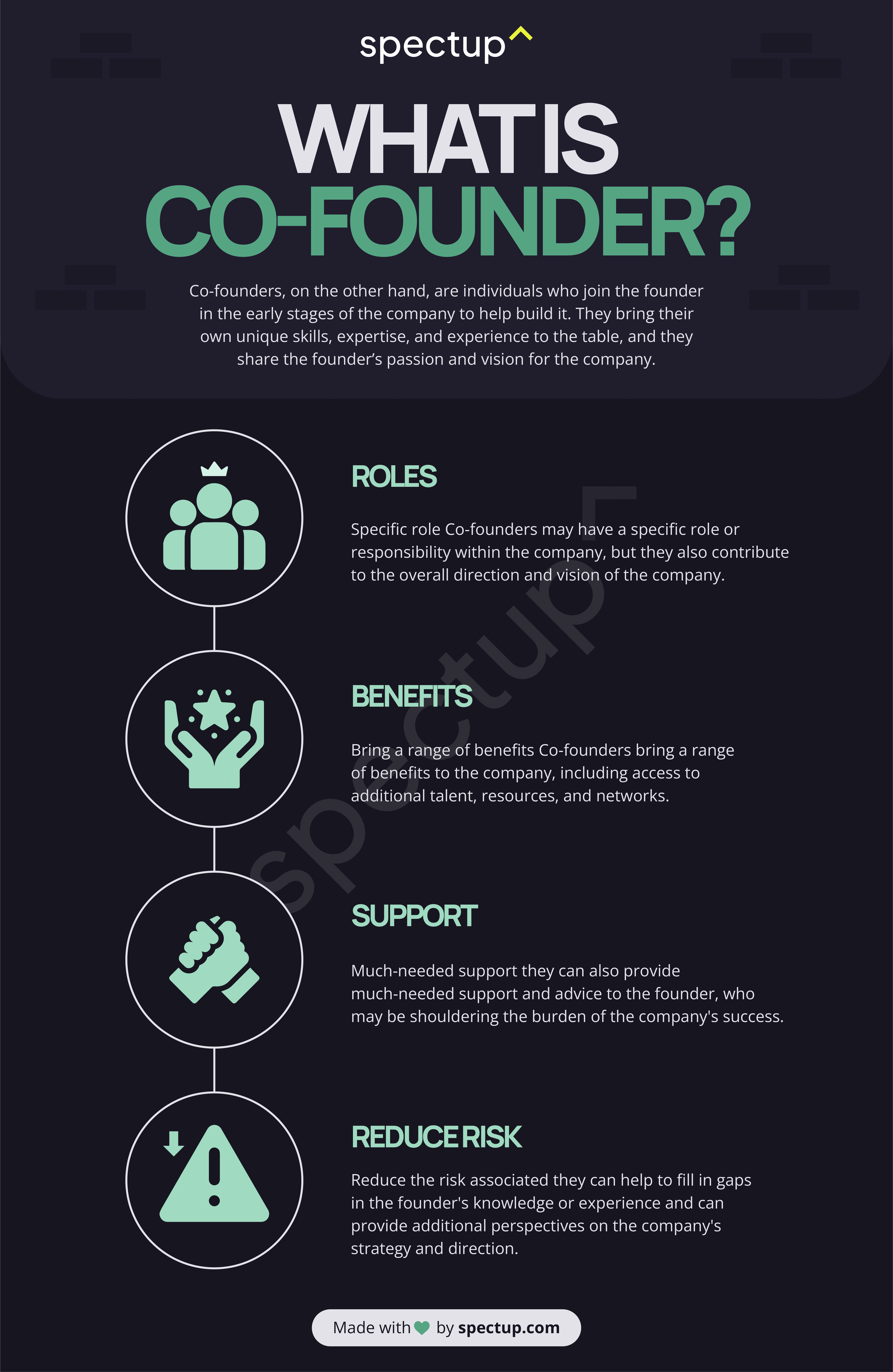Summary
When starting a company, there are many different roles that must be filled to ensure success. One of the most important decisions an entrepreneur must make is whether to dive in alone as the founder or bring on a co-founder. While both roles are crucial to building a thriving business, there are some key differences between the two.
What Is A Founder?
A founder is a person who not only comes up with and initiates the original idea for a business but also takes the risk of investing their time, money, and effort into it. Founders are often the driving force behind the company, as they put in extra hours, make sacrifices and take on responsibilities that others may not be willing to do. They are responsible for setting the tone of the company's culture and values and are usually the most committed to the company's success. Founders have the initial vision for the company and are usually the ones with the final say on major company decisions. They are also responsible for recruiting employees, securing funding and making major decisions regarding the company's growth and development.
In addition to being risk-takers, founders are also creative problem solvers. They are able to think outside the box, identify new opportunities, and come up with innovative solutions to business challenges. Founders are also excellent communicators, able to articulate their vision to potential investors, partners, and employees. For instance, some founders may seek pitch deck consulting services to help communicate their vision and ideas more effectively to investors. Founders are often the face of the company and represent its values and culture.

What Is A Co-Founder?
Co-founders, on the other hand, are individuals who join the founder in the early stages of the company to help build it. They bring their own unique skills, expertise, and experience to the table, and they share the founder's passion and vision for the company. Co-founders may have a specific role or responsibility within the company, but they also contribute to the overall direction and vision of the company. They are often responsible for executing on the founder's original vision and bringing it to life.
Co-founders bring a range of benefits to the company, including access to additional talent, resources, and networks. They can also provide much-needed support and advice to the founder, who may be shouldering the burden of the company's success. Co-founders can also help to reduce the risk associated with starting a business, as they bring complementary skills and expertise to the table. They can help to fill in gaps in the founder's knowledge or experience, and can provide additional perspectives on the company's strategy and direction.
According to research, having two co-founders is associated with a higher success rate for businesses. On average, startups with co-founders have a 30% higher chance of receiving funding, according to Fundera. This increased success is due to the mutual support, shared workload, and accountability that co-founders provide for each other. Having a co-founder is also associated with higher levels of funding for startups, which can help to accelerate growth and development.
In summary, while there are differences between founders and co-founders, both play important roles in building a successful business. Founders provide the initial vision and drive, while co-founders bring complementary skills and expertise. Together, they can create a strong team that is committed to the success of the company.

Founder vs Co-Founder: 6 Differences
Whether you are thinking about starting your own company or joining an existing one, understanding the founder vs co-founder difference is critical. It may be useful for you to understand what distinguishes the two roles, especially if you are a startup looking for assistance in recruiting your first co-founder.
Let's evaluate seven key founder vs co-founder differences and how they affect an organization's ability to succeed.
1. Involvement:
The involvement of the founder and co-founder in a company can vary depending on their individual roles and responsibilities. Typically, the founder is deeply involved in all aspects of the company's operations, including sales, marketing, and customer service. As the company's driving force, the founder is responsible for setting the company's vision and direction, recruiting employees, securing funding, and making major decisions regarding the company's growth and development. Co-founders, on the other hand, might have a more defined position or responsibility within the business, such as controlling a product's technical design or its financial operations. However, co-founders are still involved in the company's overall success and contribute to its growth and development. They provide feedback and input on major decisions and collaborate closely with the founder to help build the company.
2. Equity
The equity distribution between a founder and co-founder can vary based on a variety of factors, such as the level of involvement and risk taken by each individual. Typically, the founder will have a larger equity stake in the company compared to the co-founder, as they were the original creator of the idea and took the initial risk to start the company. However, the exact distribution of equity can be negotiated based on the co-founder's contributions and the needs of the business. According to the Carta data, only 32% of two-founder companies chose an equal equity split. When deciding on the equity split, it may be helpful to seek fundraising advisory services to ensure that the company is able to secure the necessary funding for growth and development.
3. Decision-Making
The founder typically has the final say on major decisions related to the company, such as funding, product development, and hiring. This is because the founder is often the primary visionary and driving force behind the company and is responsible for setting the overall direction and goals. However, the co-founder can also have a significant influence on the decision-making process, providing valuable input and feedback. Ultimately, the decision-making process should be collaborative and inclusive to make the best decisions for the company's success.
4. KPI’s Focus
While both founders and co-founders must be aware of KPIs, their involvement and emphasis on specific KPIs may differ. As the company's guiding factor, the founder may have a more holistic view of the business and focus on various KPIs, such as revenue, customer acquisition, and product development. Conversely, a co-founder might be more focused on a specific area of the business, such as technical development, and might have a narrower focus on KPIs related to their area of expertise. However, it is essential that both the founder and co-founder are aware of all the KPIs of the business and work collaboratively to achieve them.
5. Commitment
The founder is typically more committed to the success of the company than a co-founder, as they are the ones who came up with the original idea and took the initial risks to start the business. On the other hand, a co-founder may have other commitments or priorities outside of the business and may not be as heavily invested in the company's success. While the level of commitment may differ, both the founder and co-founder play important roles in building the company and ensuring its long-term success. It is important to ensure that the level of commitment of the co-founder is enough to contribute to the success of the company.
6. Recruitment
Recruitment is an important aspect of building a successful company, and both the founder and co-founder play a role in this process. The founder is typically responsible for setting the overall hiring strategy and making key hires, especially in the early stages of the company's development. Depending on their expertise and business needs, the co-founder may also be involved in the recruitment process. This collaborative approach to recruitment can help ensure that the company builds a team that is aligned with the overall vision and values of the business. To ensure that the recruitment process is effective, companies may consider working with the best investors outreach agencies to help identify and attract top talent.

What Is The Difference Between Co-Founder And Founding Member?
When it comes to starting a business, there are a lot of terms that get thrown around - such as co-founder and founding member. While the two might sound similar, there are some key differences to keep in mind.
Let's start with co-founders. These are the individuals who start the business together, sharing the vision and working together to bring it to life. They are typically equal partners in the business, sharing ownership and decision-making responsibilities. Co-founders often have complementary skills, with one person focusing on the technical side of things while the other takes on the business and marketing aspects.
On the other hand, founding members are individuals who are part of the business in its early stages. While they may not have the same level of ownership or responsibility as a co-founder, they still play a critical role in getting the business off the ground. Founding members are typically involved in setting up the business or organization, and may have a specific area of expertise that they bring to the table. They are often passionate about the company's mission and vision, and help to build the culture and values of the organization.
So while co-founders and founding members may have different levels of ownership and responsibility, both are crucial to the success of a business. Without the vision and hard work of both co-founders and founding members, many businesses would never get off the ground.
Can There Be 2 Founders Of A Company?
Is it possible for a company to have two or more founders? Absolutely. Many successful startups have been founded by a group of people with complementary skills and expertise. The presence of multiple founders can help to distribute the workload and provide different perspectives on the business. However, it is critical that all founders understand their roles, responsibilities, and equity in the company. When there are multiple founders, developing a strong partnership and communication strategy is critical to ensure that everyone is on the same page and working towards the same goals. By doing so, the company can leverage the strengths of each founder to build a successful and sustainable business.
Conclusion
In summary, the decision to become a founder or a co-founder is a critical one for anyone starting a business. While both roles are important, they have distinct differences in terms of involvement, equity, decision-making, KPIs focus, commitment, and recruitment. Founders are responsible for initiating the original idea and taking the risk of investing time, money, and effort into the business, while co-founders join in the early stages to help build it.
Having two co-founders is associated with a higher success rate for businesses, as they provide mutual support, shared workload, and accountability. However, it is important for all founders and co-founders to understand their roles, responsibilities, and equity in the company to ensure a strong partnership and communication strategy.
Whether you are considering starting your own business or joining an existing one, understanding the difference between founders and co-founders is critical for your success. By leveraging the strengths of both roles, you can create a strong team that is committed to building a successful and sustainable business.
Niclas Schlopsna
Partner
Ex-banker, drove scale at N26, launched new ventures at Deloitte, and built from scratch across three startup ecosystems.







